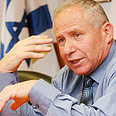
Dichter to ministers: Let IDF handle Qassams
Internal security minister sparks row in weekly government meeting after saying ministers did not instruct army to present plan for stopping Qassam fire from Gaza Strip. Chief of staff responds: I am unfamiliar with plan which can be executed which we are not implementing
Dichter's criticism caused angry reactions from his fellow ministers.
Dichter, who did not spare his criticism, added that "there was not even one case in which the government instructed the IDF to present a plan aimed at halting, and not reducing, the Qassam fire from Gaza to Israel. Therefore, the IDF did not present the government or the cabinet with such a plan, or alternatively did not say that it cannot stop the Qassam fire."
"It seems that the fact that for months there were no serious injuries from the Qassam fire enabled us to return to routine. But statistics did their job. Last week a woman was killed in Sderot and three of the city's residents were seriously injured," he said.
IDF Chief of Staff Dan Halutz turned to Dichter and asked him if he had an idea how to stop the Qassam fire from the Gaza Strip.
"I am unfamiliar with a plan that can be executed which we are not working according to," Lieutenant General Halutz said.
National Infrastructure Minister Binyamin Ben Eliezer said that "we must put a cross on the heads of Ismail Haniyeh and those similar to him."
Tourism Minister Isaac Herzog decided to slam Dichter: "It's like telling the internal security minister to stop crime and he will stop it. It's unrealistic."
The internal security minister, however, continued to stick to his position that there are solutions but the government is not implementing them.
Foreign Minister Tzipi Livni turned to Dichter and said, "If there is such a plan, it has to be presented." The internal security minister did not say a word.
Prime Minister Ehud Olmert also turned to Dichter and said, "If you have an idea, bring it."
Transportation Minister Shaul Mofaz said to Dichter, "If you are in favor of occupying the entire Gaza Strip, only say so." Dichter remained silent.
Defense Minister Amir Peretz also decided to interfere: "There was no plan that wasn't approved. Every plan was approved."
The army chief responded: "If the army had magic solution, it would not wait for instructions. The lineup of solutions is not only related to the military preparedness, but also to the prices you are willing to pay. An example of the prices is that Beit Hanoun incident."
Dichter said in response: "We must not hurt civilians in return.
Minister Yitzhak Cohen (Shas) suggested his own original solution: "Implementing Security Council Resolution 1701 in Gaza can solve the Qassam."
When it was Vice Premier Shimon Peres' turn to speak, his speech was fiery: "First of all, you have to understand that thousands of mortar shells and thousands of Qassams have landed and 15 people were killed. We are members of a government, and not those who deliver speeches at the square. We have to provide operative suggestions.
"Handling this must include fortification on the one hand and an offensive element on the other hand. I am not suggesting, for example, to occupy the entire Strip and take responsibility over 1.5 million people."
Peres asked his fellow ministers to stop speaking harshly. "Our job is to come up with solutions, not to compete with the public," he said.
Olmert: We are operating in Gaza
After the minister had their say, Prime Minister Olmert said: "Let's say someone has a brilliant idea on how to stop the Qassam fire and the strengthening in Gaza. I doubt it that there is such an exclusive idea and then Israel's problems from Gaza will end. I do not accept it and it is also inappropriate to present that there is such a solution.
"The chief of staff is sitting here, and it has been claimed that he has such an exceptional plan and he is being polite and not presenting it because we have not instructed him to present it. I suggest you be sensitive to what is evident from what you are presenting."
Olmert went on to elaborate on the Israel Defense Forces' operations in the Gaza Strip in the past months.
"For three and a half months Israel is operating in the Gaza Strip. About 370 armed Palestinians were killed. In total, the world is accepting this operation because Israel is being fired on. We have been criticized twice: In the Ghalia family incident and in the second incident of Beit Hanoun. And all this in three and a half months."
"We are operating against terror all the time. I definitely understand that the ministers have suggestions. Bring them to a government discussion. We will talk about them. I don’t want to read about them in the paper.
"I don’t have to decide whether to support the Saudi initiative through the newspaper. I don’t have to decide if there is a war on the part of the IDF or if there is no such war through a journalistic interview. Start getting used to the fact that you are government members, not members of an argument club," the prime minister concluded.










